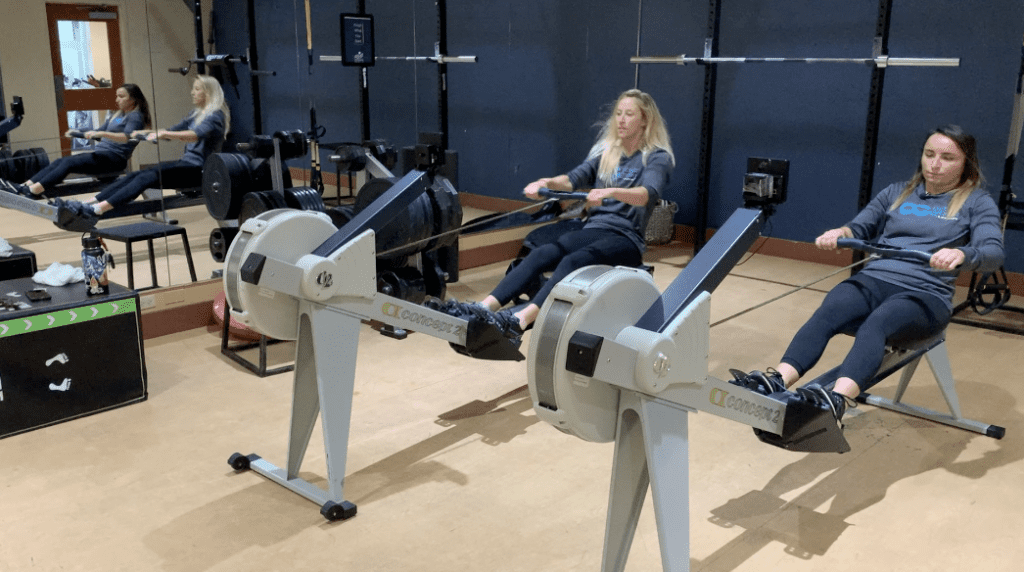Annapolis Women to Row 3,000 Miles for At-Risk Foster Youth

By Cheryl Costello
It’s billed as “The World’s Toughest Row”, following a 3,000-mile Atlantic Ocean course from the Canary Islands off of Spain to Antigua in the Caribbean. More people have successfully climbed Mount Everest than have completed the Talisker Whisky Atlantic Challenge.
But that’s exactly what a sailing rigger from Annapolis and a boat captain are training to undertake. And they’re doing it to launch a program helping kids who age out of the foster care program, by connecting them with marine trades jobs. Bay Bulletin caught up with these motivated young women in the training room.
Working out on the rowing machines at the Annapolis Athletic Club, Nini Champion and Lisa Roland are working towards their goal. Champion, a sailboat rigging tech, and Roland, a captain who lives her life at sea, hope to complete the 3,000-nautical mile row from Spain to Antigua in 45 days.
It’s also a fundraising mission that travels far beyond the mental and physical endurance needed to race. Roland experienced the ups and downs of foster care. Now, she and Champion will take on the ups and downs of ocean waves (up to 20 feet high at times)—in part to raise money for maritime education grants for youth who were in foster care.
“I grew up in the foster care system and then I’ve gone on to become the captain of yachts and just the whole maritime industry has changed the trajectory of my life,” she says. “There were a lot of really hard years. It was not the greatest way to grow up. And one of the most important thing is that kids from the system, they don’t have somebody who can tell them that they can go accomplish whatever they want.”
Roland formed a team with Champion a few years ago after they witnessed the emotions from the Talisker Whisky Atlantic Challenge from the finish line. The ocean rowing event happens every December. The two women, known as Team Ocean Grown, are aiming for 2022, so they have another year to train and fundraise.
The training will take some work: neither woman has a rowing background. Both identify as sailors. But they’re confident about taking on the ocean in a specially equipped ocean-going boat.
“It’s a completely unassisted race, so we can’t take on any outside assistance,” Roland explains. That means they must produce their own water with a desalination device, carry 4,000 calories’ worth of military rations for each day aboard, and the bathroom is … a bucket. There is a small cabin to duck into during severe weather.
Roland and Champion will only have each other at sea for at least 45 days. While the general goal is to stay in the boat, sometimes they’ll have to jump in for a dip. “Actually, we will be getting in the water because it’s important that we clean the bottom of the boat in order to keep up speed, like less resistance, because a lot of things will grow,” Roland explains. But they know to be careful.
“The idea of like, thousands of feet beneath you …” says Champion. “It is crazy,” Roland adds. “You don’t want to drop anything.”
Team Ocean Grown is still raising money for their own boat and seeking sponsors for operational costs, which will reach about $100,000. They set up a tent outside McGarvey’s Saloon & Oyster Bar during the Annapolis Boat Shows, and the crowd was generous.
The team is also actively raising funds for Homebridge Youth Society, in Canada where Roland grew up, which provides residential care to youth in the foster system.
“For these kids, I really want to be that person,” she says.
The team will show foster kids the definition of perseverance—alternating two hours on, two hours off. In all, race organizers say each team will take more than 1.5 million oar strokes over the race.
Just how grueling is it? Rowers burn more than 5,000 calories per day, and by the end of the race the rowers have lost an average of 26 pounds. Team Ocean Grown plans to bulk up before the race in preparation. And of course, they’ll practice rowing … a lot.
“You just get to a point where you keep going and going. Kind of not thinking, that’s the goal,” Roland says.
